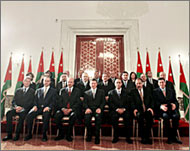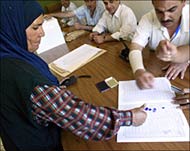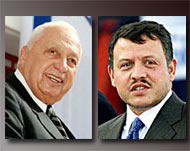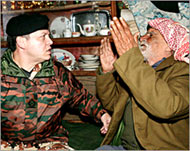Jordanian reform warrants scrutiny
Jordan’s political elite is cautiously monitoring moves by the government of Prime Minister Faisal Fayiz towards political improvement.

Fayiz, well aware of the uphill battle he is facing, has pledged to conduct dialogue with all political forces “without exception”, a reference to opposition parties and trade unions that are spearheading the drive for political change.
He has extended an olive branch to the political foes of former governments and toured the country to investigate public opinion.
To drive the idea of reform home, the new cabinet included a political development portfolio, a post that has been created for the first time in the Hashemite kingdom‘s history.
Political evolution
However, six months after the formation of this new cabinet, opposition leaders say the government has failed to come up with the goods.
The controversial election law is yet to be amended, public freedoms remain constrained and remnants of martial law are still in place.
“We believe the development process should have several axes including public freedoms and showing respect to the rights of citizens and the role of civic society institutions as partners in the decision-making process,” leader of the Muslim Brotherhood Movement Abd al-Majid Thunaibat said.
|
“We believe the development process should have several axes including public freedoms and showing respect to the rights of citizens and the role of civic society institutions as partners in the decision-making process” Abd al-Majid Thunaibat, |
He told Aljazeera.net that any blueprint for change should address the election law “to ensure it does justice to all groupings and guarantees equality for the entire electorate”.
The present law, based on the one-person-one-vote formula, came into operation in the 1993 general elections.
The resulting Lower House of Parliament then enabled the government of late King Hussain to push through the peace treaty it concluded with Israel in 1994, analysts said.
Islamists and other opposition figures argue the legislation deprived parties, particularly the Muslim Brotherhood and its political arm, the Islamic Action Front (IAF), of the opportunity to clinch a large number of seats in the House of Representatives as they did upon the resumption of the parliamentary process in 1989 after a rupture of 27 years.
1967 occupation
The suspension of parliamentary life was dictated by Israel‘s occupation in 1967 of the West Bank, which then formed part of the Hashemite kingdom of Jordan.
Critics of the election law say that it excludes the chance to “forge alliances” among political parties and consequently forces even party members to depend on tribal affiliations for securing seats in parliament.
 |
|
Jordan’s King Abd Allah (C) with |
“We believe that the success or failure of the political development process lies with the government,” says Thunaibat.
“Taking genuine steps towards ensuring political pluralism and circulation of power will be the criteria according to which we are going to judge the government’s moves.”
This viewpoint is shared by secretary-general of the Jordanian Communist party, Munir Hamarneh, who stresses the need for “removing all limitations to political development, including certain laws and restrictions on public freedoms as well as remnants of the martial law era and ruling out the possibility of resorting to martial law again”.
Strong parties
“The process should also involve a reinvigoration of the constitution in such a manner that gives citizens the right to free thinking and ideology,” he said.
Hamarneh attaches particular importance to the amendment of the election law and the political parties law, which he says should be “updated in such a fashion that permits the creation of strong parties instead of placing obstacles in the path of their evolution.
“Throughout history, the election law has represented either an obstacle or a clue for political development,” he said.
According to the present law, a Jordanian citizen is eligible to one vote, whereas he used to be able to cast a number of votes equal to the number of candidates running in any certain constituency.
Key obstacle
Thunaibat, Hamarneh and other critics argue that the country should be divided into 110 one-candidate constituencies in order to ensure fairness.
 |
|
An illiterate Jordanian woman |
They consider variety in the number of seats assigned to each constituency a key obstacle to democracy.
“The present election law excludes performance of political parties. All those who won seats at the Lower House of Parliament in the June elections this year managed to do so by depending on tribal links,” Hamarneh said. “Even IAF candidates were obliged to resort to their tribal bases,” he added.
“The old election law permitted the forging of alliances among parties, even in the 1950 elections political parties managed to secure seats on their own at parliament,” he said.
Parliamentary blocs
The IAF, Jordan‘s largest and most organised party, returned 17 deputies at the House of Representatives in the June polls.
All other parties and political groupings, the number of which could reach 30, failed to secure more than two seats at the 110-member house despite alliances, which they formed for this purpose.
However, a positive element emerged over the past few months with the formation of parliamentary blocs by political parties that have common ideological ground.
 |
|
Jordan’s King Abd Allah (R) is |
The IAF teams up with some 13 other Arab nationalist and left-leaning opposition parties and 12 trade unions to form a joint front for the avowed aim of derailing normalisation of ties with Israel, with which the Jordanian government concluded a peace treaty in 1994.
Thunaibat said the IAF already has “a blueprint and a programme of action that qualifies it to form a government” according to Islamic teachings.
However, he excluded the possibility of the IAF being assigned such a role for the time being, taking into account the prevailing world order and the fact that Islamists have been at loggerheads with successive governments in Jordan over the past decade since the conclusion of the peace pact with Israel.
“The time is not opportune for the IAF to form a government, given the present circumstances and the normalisation of the country’s ties with the Zionist enemy,” Thunaibat said.
Prominent academics also rule out Islamists being permitted to form governments.
“The present world order does not sanction the formation of cabinets by Islamists. The Algerian example is not far from us,” said Ghazi Rababa, professor of political science at the University of Jordan.
An Islamic state
|
“Parties should merge into fewer, but stronger groupings, and have clear and convincing political programmes according to which they run elections” Ghazi Rababa, |
He was alluding to the cancellation of election results in Algeria in the early 1990s, when the Islamic Salvation Front won a majority of seats at the National Assembly.
“This can also be easily perceived from the latest statements by US President George Bush and the American [occupation] administrator in Iraq, Paul Bremer, who made it clear that Washington will not allow an Islamic state to emerge in that occupied Arab country,” Rababa said.
“Ironically, the United States led a war to knock out the secular regime of President Saddam Hussein last year,” he added.
However, Rababa believes King Abd Allah was at pains to come up with “an indigenous version of political evolution” that precludes foreign prescriptions, which lately found expression in Bush’s Greater Middle East Initiative.
“Such process should be conducted in an atmosphere of fairness, accountability, transparency, rule of law, equality and real participation of women and youth,” said the king a the start of the political shake-up.
According to Rababa the king wants political sophistication to enable power to circulate.
 |
|
King Abd Allah travelled the |
However, he found the “proliferation of parties in the country, their lack of popular bases and the failure to align politics with geography forces that work to retard political change” a problem.
Rababa believes tribal, family and geographical links, which emerged in this year’s general elections, decide the outcome of the ballot process.
He and other academics detected other impediments to political evolution, namely deficient political education among candidates, loyalty of some parties to foreign countries and a lack of interest in politics among the population.
“Parties should merge into fewer, but stronger groupings, and have clear and convincing political programmes according to which they run elections,” Rababa said.